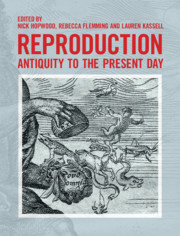Book contents
- Reproduction
- Frontispiece
- Reproduction
- Copyright page
- Dedication
- Contents
- Exhibits
- Illustrations
- Notes on the Frontispieces
- Contributors
- Acknowledgements
- Introduction
- Part I Inventing Generation
- Part II Generation Reborn and Reformed
- Part III Inventing Reproduction
- Part IV Modern Reproduction
- Part V Reproduction Centre Stage
- 34 World Population from Eugenics to Climate Change
- 35 Sex Hormones, Pharmacy and the Reproductive Sciences
- 36 Technologies of Contraception and Abortion
- 37 Hospital Birth
- 38 Prenatal Diagnosis, Surveillance and Risk
- 39 Artificial Fertilization
- 40 Modern Law and Regulation
- 41 Sex, Gender and Babies
- 42 Feminism and Reproduction
- 43 Globalization
- Epilogue
- Exhibits
- Select Bibliography
- Index
35 - Sex Hormones, Pharmacy and the Reproductive Sciences
from Part V - Reproduction Centre Stage
Published online by Cambridge University Press: 16 November 2018
- Reproduction
- Frontispiece
- Reproduction
- Copyright page
- Dedication
- Contents
- Exhibits
- Illustrations
- Notes on the Frontispieces
- Contributors
- Acknowledgements
- Introduction
- Part I Inventing Generation
- Part II Generation Reborn and Reformed
- Part III Inventing Reproduction
- Part IV Modern Reproduction
- Part V Reproduction Centre Stage
- 34 World Population from Eugenics to Climate Change
- 35 Sex Hormones, Pharmacy and the Reproductive Sciences
- 36 Technologies of Contraception and Abortion
- 37 Hospital Birth
- 38 Prenatal Diagnosis, Surveillance and Risk
- 39 Artificial Fertilization
- 40 Modern Law and Regulation
- 41 Sex, Gender and Babies
- 42 Feminism and Reproduction
- 43 Globalization
- Epilogue
- Exhibits
- Select Bibliography
- Index
Summary
- Type
- Chapter
- Information
- ReproductionAntiquity to the Present Day, pp. 521 - 534Publisher: Cambridge University PressPrint publication year: 2018



